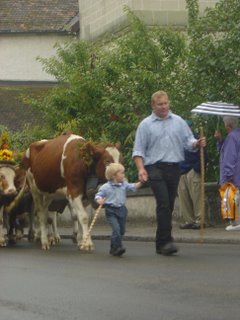Alpabfahrt
Today a friend and I took our small boys to Sumiswald in the Emmental region* to see the Alpabfahrt, the ritual of the cows returning from their Alpine summer homes. A great many Swiss dairy cows summer in the mountains (as do sheep and goats) - I would even say the majority, but I don't have actual research to back that up. At the end of the summer, as the weather turns cold at altitude, the cows are brought back down to their stalls in the flatlands. The Alpabfahrt was always a cause for celebration and entire villages would turn out to welcome the cows home. The cows would be groomed for the occasion, wearing their best bells and crowns of flowers, and the farmers would wear their best clothes. The cows would be paraded through town and the residents would celebrate the return of the cows - their livelihood, after all.
Many farmers now simply ferry their cows home in cattle trucks, but several villages still perform the traditional Alpabfahrt. Larger villages have realized that it can also be a powerful tourist attraction and combine the parade of cows with other festivities; some villages perform the Chäseteilet (dividing of the cheese) and visitors can watch the distribution of the cheese and enjoy local specialties. The Sumiswald Alpabfahrt was pretty low-key; it's a small village and off the beaten track. Most of the people there were locals. We saw a few school classes getting out for the morning to enjoy the festivities; P and I were probably the only people there who drove an hour to watch, but you never know.
I'm disappointed with a lot of my pictures - we haven't bought that new digital camera yet and R and I are getting increasingly frustrated with our point-and-shoot - but even though some of them are blurry I'm posting them because it's the Alpabfahrt, and after all those times people say things like "oh, you'll be waiting until the cows come home" here they are. The cows are coming home.



The traditional clothing is called Trachtenkleider. The vests worn in the pictures above are for more special occasions; the blue shirts with the rows of Adelweise in the picture below are traditionally farmers' work shirts. We bought one for Small Boy and he is so beautiful in this shirt. And he has several generations of farmer blood on R’s side – both maternal and paternal lines lie close to the land – so he can wear it with pride.
In the picture above, the cow on the left is wearing a Treichel (Treichle in Swiss German) – a cowbell made from a single sheet of metal that is beaten into shape. The cow on the right is wearing a Glocke (Glogge in Swiss German) – a cowbell that is made by pouring liquid metal into a form. The cow in the next picture has a Treichel, and a fabulous head-dress.

R's family farms. R's dad gave up on cows long, long ago - as they say around here, eine Kuh macht Müh, viele Kühe machen Mühe (one cow makes mooo, many cows make trouble) - and now they only farm crops. It's a hard life; it's uncertain and it's hard on the body and dairy farmers can never take vacation. I like it that somewhere in a village people groom the cows, and put flowers on their heads, and put on their Sunday best and parade through town with their children and grandchildren. It's a hard life, it's a risky life, and it is a big deal that the cows are coming home. They should celebrate. They should be proud.
This is a beautiful tradition, and I hope villages like Sumiswald hold on to it tight.
* The Emmental region is the home of Emmentaler cheese - that cheese with the holes in it that people in the States call "Swiss cheese." If you want to taste real Cheese with Holes In It, buy some genuine Swiss Emmentaler.
Labels: Schweizermacher



2 Comments:
So is there a similar festival when the cows leave for the mountains in Spring?
I think I'll come back as a Swiss cow in my next life so I can spend summers in the Alps. Not a bad lifestyle!
Junebee - the cows going up to the mountains in the spring (the Alpauffahrt) isn't celebrated the way the return of the cows is.
Post a Comment
Subscribe to Post Comments [Atom]
<< Home